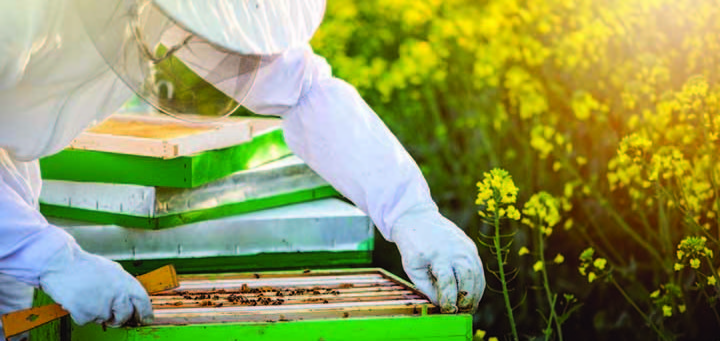BEEKEEPING

An ancient craft in your own backyard
One of our oldest professions, the ancient practice of beekeeping, is experiencing something of a renaissance. In 2015, a record number of colonies—just over 721,000—were in operation across Canada, with almost 300,000 of those in Alberta alone. When you look at the big picture, it’s no wonder. Besides producing honey and beeswax, bee colonies bring many other benefits, both to the people who care for them and to the communities where they are located.
Cheap & Easy
As far as hobbies go, keeping a backyard hive (or two) is neither exhausting nor expensive. Much of what you’ll need to spend, in time and money, will come early on as you’re getting into it. For starters, you’ll need to do some research. Find out what bylaws regulate beekeeping in your area and how to register your hives. Figure out what equipment you’ll need and how to use and maintain it. Also, learn about the different kinds of bees so that you can choose one that’s appropriate for you (subtle hint: don’t start with an aggressive strain). You’ll also need to buy a few things: hives, hive stands, protective clothing, smokers, feed, other tools and supplies, and, of course, bees—all of which will probably set you back a few hundred dollars.
Once your beehive is up and running, the rest will be fairly straightforward. It’ll take a year before you can start harvesting
A Little Pocket Money
For many, beekeeping is a labour of love. But it doesn’t hurt if your hobby can provide you with extra pocket money. Once your first hive is a success, you can set up additional hives (provided you have the room). Extra honey means extra honey you can sell, perhaps at farmers’ markets, from your home or in local stores. You’ll also have excess beeswax that can be made into candles, lip balm, hand lotion and so on. There’s even a viable market for renting out bee colonies to farms to help pollinate crops. In Alberta, thousands of hives are rented each year just for this purpose. According to the Canadian Honey Council, the average rental fee for a hive is $120, depending on the crop that needs to be pollinated.

Stress? What Stress?
Urban beekeepers often talk about the stress-busting power of beekeeping. Like bird watching, gardening or watching cat videos, there’s something calming about keeping bees. Plus, there’s a whole social aspect to apiculture. As the activity spreads across the country, many cities and towns now have beekeeping clubs. Newbies can easily join a passionate community of fellow beekeepers, where they can get advice and start new friendships.
Better Gardens
Even if they’re not actively beekeeping themselves, urban gardeners benefit from having bees in the neighbourhood. The reason is simple: most flowering plants reproduce through cross-pollination. This requires an animal pollinator to move pollen from one flower to another, and bees are the best known and most efficient pollinators nature has to offer. Bees visit flowers to gather nectar and pollen, their main sources of energy, fat and protein. As they move about, they inevitably carry pollen grains to the flowers they visit, allowing cross-fertilization to happen. So, the benefit is mutual—gardens feed bees, and bees help gardens thrive, promoting biodiversity and ecological stability in urban areas.
Saving Bees
As you likely know, beekeeping may actually contribute to helping save the world’s bee populations, which have been in decline for some time now. In Canada, a combination of pesticide use, habitat loss, poor nutrition, disease, mites and severe winters has been blamed for colony losses. The good news? The rate of loss has slowed over the last decade, according to data from the Canadian Association of Professional Apiculturists. At the same time, the number of honeybee colonies across the country has increased by 22.4 percent. t8n
Fun Fact
When it’s properly sealed, honey may be the only food that never spoils in its edible form.
This is due to unique antibacterial properties, such as high acidity and an absence of water, which prevent many microorganisms from growing in it. Archaeologists have found (and apparently tasted!) preserved, millennia-old pots of honey while excavating Egyptian royal tombs.
More Like This
Camping Cuisine
Read
Summer Cocktails
Read
Road Trip Restaurants
Read





